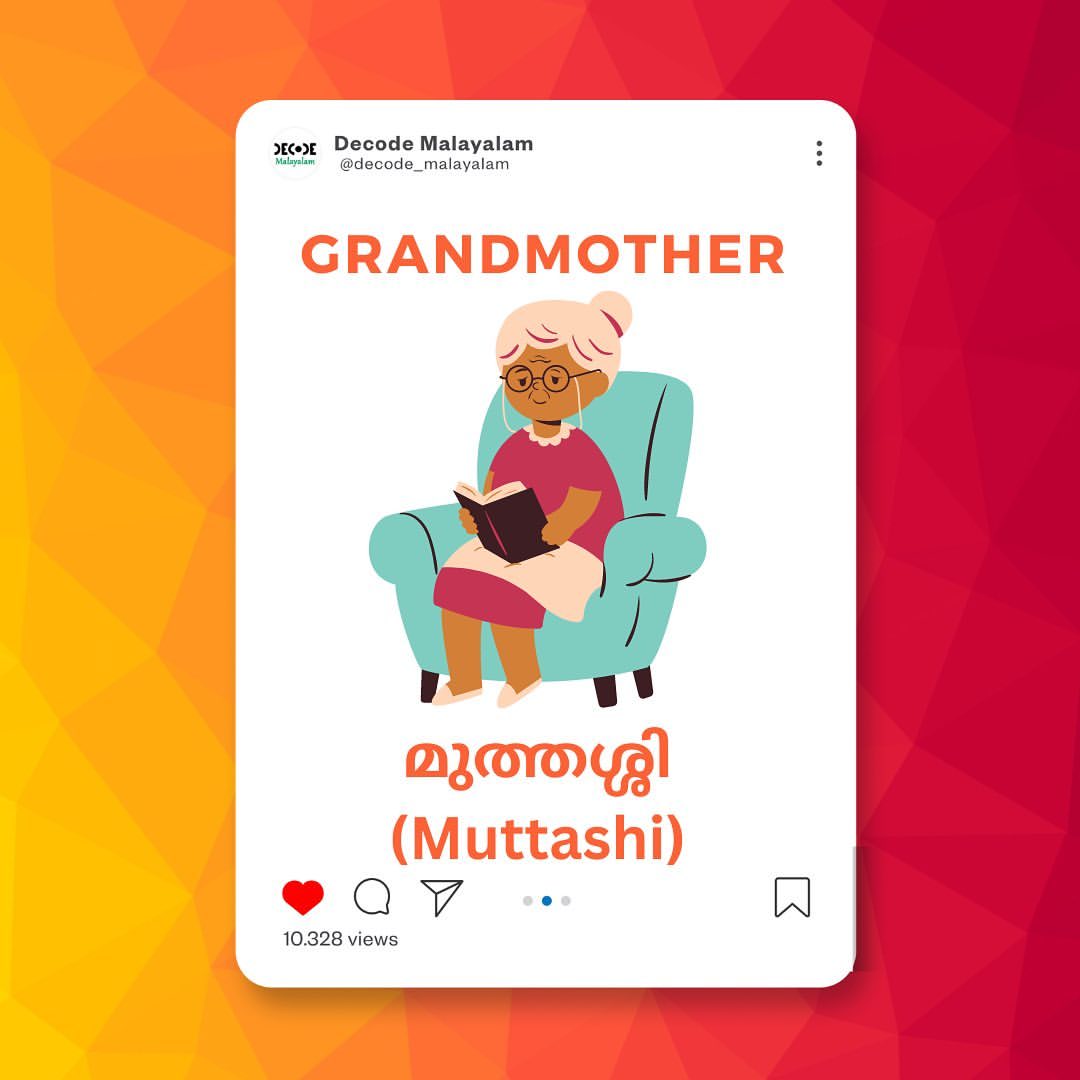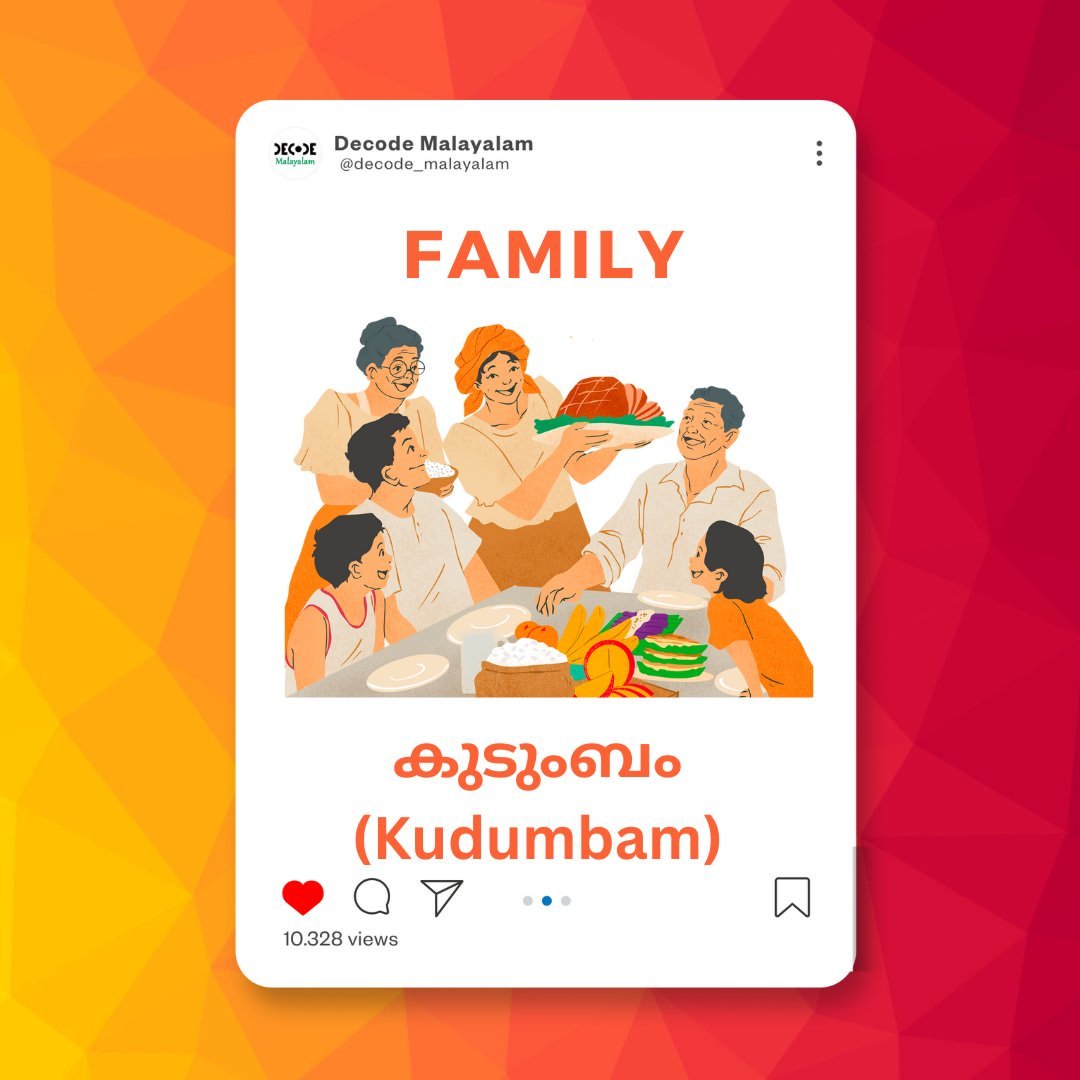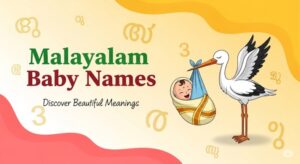Introduction
Kerala, often referred to as “God’s Own Country,” is a land of rich traditions, vibrant cultures, and exquisite cuisine. Central to its culinary brilliance are the spices that not only add flavor but also tell a story of the region’s heritage and trade history. Understanding and learning about these spices in Malayalam can enhance your culinary skills and deepen your appreciation of Kerala’s gastronomic landscape. Whether you’re a food enthusiast or someone keen on learning a new language, this guide will take you through the aromatic world of spices in Malayalam.
The Importance of Spices in Malayalam Cuisine
Historical Significance
Kerala’s history is intricately linked with spices. The state’s strategic location on the Malabar Coast made it a hub for spice trade with Arabs, Chinese, and Europeans. Spices like black pepper, cardamom, and cloves not only enriched the local cuisine but also played a pivotal role in global trade routes. Learning the names of these spices in Malayalam provides insight into their cultural and historical significance.
Culinary Delight
Kerala cuisine is renowned for its depth of flavor, which is achieved through a masterful use of spices. From the fiery kick of red chili powder to the warm sweetness of cinnamon, each spice contributes to the unique taste of dishes like Sambar, Avial, and various seafood curries. Knowing these spices in their native names enhances your culinary adventures and ensures authenticity in your cooking.
List of 20 Spices in Malayalam
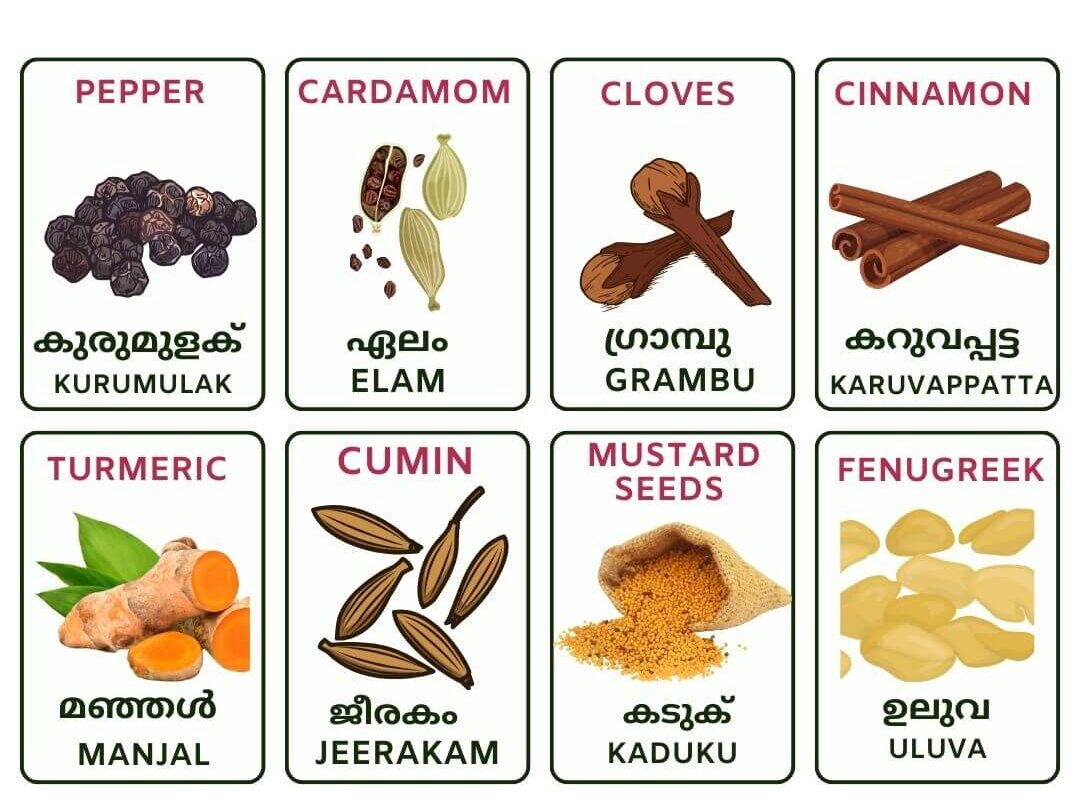
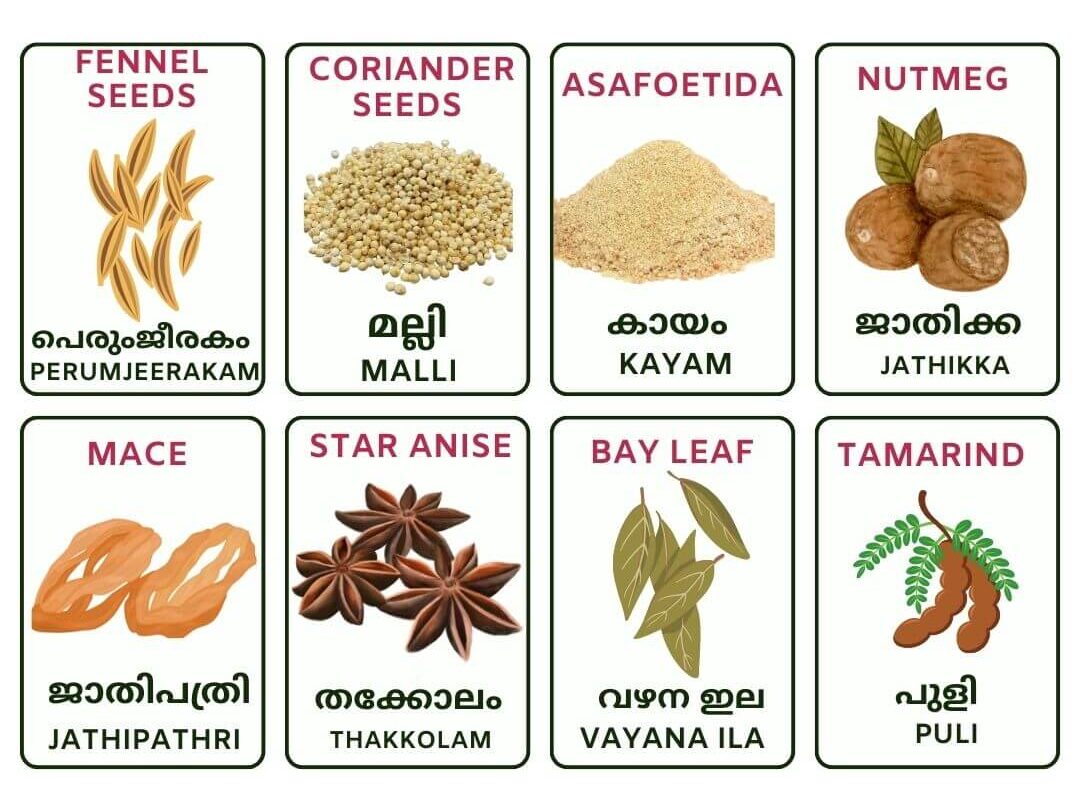
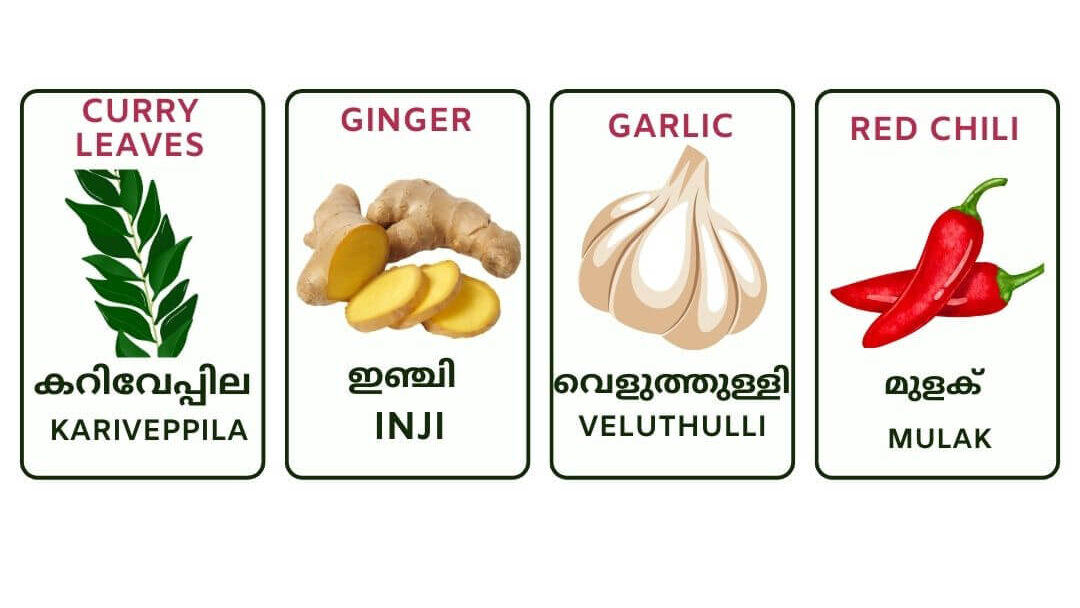
Spices in Malayalam
| English Name | Malayalam Name | Transliteration |
|---|---|---|
| Pepper | കുരുമുളക് | Kurumulak |
| Cardamom | ഏലം | Elam |
| Cloves | ഗ്രാമ്പു | Grambu |
| Cinnamon | കറുവപ്പട്ട | Karuvappatta |
| Turmeric | മഞ്ഞൾ | Manjal |
| Cumin | ജീരകം | Jeerakam |
| Mustard seeds | കടുക് | Kaduku |
| Fenugreek | ഉലുവ | Uluva |
| Fennel seeds | പെരുംജീരകം | Perumjeerakam |
| Coriander seeds | മല്ലി വിത്തുകൾ | malli vithukal |
| Asafoetida | കായം | Kayam |
| Nutmeg | ജാതിക്ക | Jathikka |
| Mace | ജാതിപത്രി | Jathipathri |
| Star Anise | തക്കോലം | Thakkolam |
| Bay Leaf | വഴന ഇല | vayana ila |
| Tamarind | പുളി | Puli |
| Curry leaves | കറിവേപ്പില | Kariveppila |
| Ginger | ഇഞ്ചി | Inji |
| Garlic | വെളുത്തുള്ളി | Veluthulli |
| Red chili | മുളക് | Mulak |
Learning Spices in Malayalam: Practical Tips
Enroll in an Online Course
One of the most effective ways to learn Malayalam and its rich vocabulary, including spices, is through structured online courses. Platforms like Decode Malayalam offer comprehensive lessons that cover both the basics and advanced levels of the language. These courses often include interactive modules, quizzes, and practical exercises that enhance your learning experience.
Use Flashcards
Flashcards are a great tool for memorizing new vocabulary. Create flashcards with the name of the spice in English on one side and its Malayalam equivalent on the other. This method helps reinforce memory through active recall.
Cooking Practicals
Incorporate your learning into daily cooking. Label spices in your kitchen with their Malayalam names and try to use them when preparing meals. This practical approach helps in retaining the names and understanding their usage better.
Language Exchange
Join language exchange communities where you can practice Malayalam with native speakers. Platforms like Tandem and HelloTalk connect you with Malayalam speakers around the world. Conversing with native speakers can significantly improve your pronunciation and fluency.
Mobile Apps
Leverage mobile apps designed for language learning. Apps like Duolingo, Memrise, and Rosetta Stone offer Malayalam courses that are user-friendly and interactive. These apps often gamify the learning process, making it enjoyable and effective.
Benefits of Learning Spices in Malayalam
Enhanced Cultural Appreciation
Understanding the names of spices in Malayalam enriches your cultural knowledge and deepens your connection to Kerala’s heritage. It allows you to appreciate the historical and social contexts in which these spices are used.
Improved Culinary Skills
For those passionate about cooking, knowing spices in their native language can enhance the authenticity of your dishes. It also makes following traditional recipes easier, as many authentic cookbooks and family recipes are written in Malayalam.
Cognitive Benefits
Learning a new language has been shown to improve cognitive functions such as memory, problem-solving skills, and creativity. It can also enhance multitasking abilities and delay the onset of age-related cognitive decline.
Social Connections
Knowing Malayalam can help you connect with the Malayali community worldwide. Whether you’re traveling to Kerala or participating in cultural festivals, speaking the language helps in building meaningful relationships and understanding local customs better.
Statistics and Data
According to Ethnologue, Malayalam is spoken by over 35 million people, primarily in the Indian state of Kerala and the union territories of Lakshadweep and Puducherry. The spice trade significantly contributes to Kerala’s economy, with the state producing 97% of India’s pepper and a large percentage of cardamom, ginger, and turmeric.
Conclusion
Embarking on a journey to learn spices in Malayalam opens up a world of culinary delights and cultural understanding. It enhances your cooking skills, enriches your appreciation of Kerala’s rich heritage, and connects you to a vibrant community of Malayalam speakers. Whether you’re a culinary enthusiast or someone eager to learn a new language, the benefits are manifold.
At Decode Malayalam, we offer specialized courses designed to make your learning experience both enjoyable and effective. Enroll today and start your flavorful journey into the world of Malayalam and its spices. Dive into the rich tapestry of Kerala’s culinary heritage and bring authenticity to your kitchen with every dish you prepare.
Embrace the language, savor the spices, and let Decode Malayalam be your guide.
Read More:


